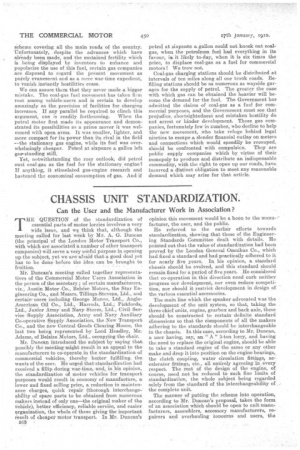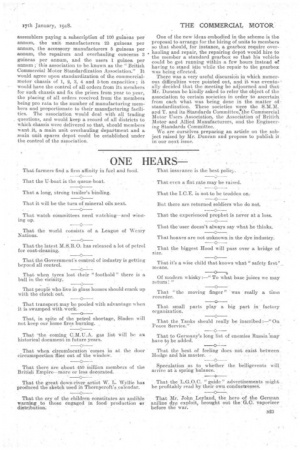CHASSIS UNIT STANDARDIZATION.
Page 2

Page 3

If you've noticed an error in this article please click here to report it so we can fix it.
Can the User and the Manufacturer Work in Association?
THE QUESTION of the standardization of essential parts of motor lorries involves a very wide issue, and we think that, although the meeting called for last week by Mr. A. G. Duncan (the principal of the London. Motor Transport Co., with which edit associated a number of other transport cornpanieS) will serve a very useful purpose in opening up the subject, yet we are afraid that a good deal yet has to be done before the idea can be brought to fruition. . Mi. Durican's meeting called together representafives of the CoMmereial Motor Users Association in the person of the secretary.; of certain manufacturers, viz., Austin Motor Co., Belsize Motors, the Star Engineering Co., and Messrs, Tillings-Stevens, Ltd., and Certainusers including George Munro, Ltd., AngloAmerican Oil Co., Ltd., -Harrods, Ltd., Pickfords, Ltd., Junior Arniyand Navy. Stores, Ltd., Civil Service •Supply ASsociation, Army and Navy Auxiliary Co-operative SupPly Association. the New Transport Co:, and the new Ceara! Goods Clearing House, the last two being represented by Lord .Headley,. :Mr.Adams, of Belsize Motors, Ltd.. occupying the chair.
Mr. Duncan introduced the subject by saying that possibly the meeting-might result in an appeal to the manufacturers to co-operate in the standardization of commercial vehicles, thereby batter fulfilling the wants of the user. He urged that standardization had received a fillip during war-time, and, in his opinion, the standardization of motor vehicles for transport purposes would result in economy of manufacture, a lower and fixed selling price, a reduction in maintenance charges, quick repair (thorough interchangeability of spare parts to be obtained from numerous makers instead of only one—the original maker of the Vehicle), better efficiency, reliable serviee, and easier organization, the whole of these giving the important result of cheaper motor transport. In Mr. Duncan's n18 opinion this movement would be a boon to the menu-facturer, the user, and the public.
He referred to the earlier -efforts towards standardization, showing that those of the Engineering Standards Committee dealt with details. He pointed out that the value of standardization had been proved by the London General Omnibus Co., which had fixed a standard and had practically adhered to it for nearly five years. In his opinion, a. standard eha.ssis should be evolved, and this standard should remain fixed for a period of five years. He considered that co-operation in this direction need curb neither progress nor development, nor even reduce competition, nor should it restrict development in design of the various essential accessories.
The main line which the speaker advocated was the development of the unit system, so that, taking the three chief units, engine, gearbox and back axle, these should, be constructed to certain definite standard dimensions so, that the cOmponents of all the makers adhering to the standards should be interchangeable in the chassis. In this case, according to Mr. Duncan, a user having, say, an " A " 3-ton lorry, and having the need to replace the original engine, should be able to take a standard engine of the same, or any other make and drop it into position on the engine hearings, the clutch coupling, water circulation fittings, accelerator fittings, etc., all entirely agreeing in every respect. The rest of the design of the engine, of course, need not be reduced to such fine limits of standardization, the whole subject being regarded solely from the standard of the interchangeability of the complete unit.
The manner of putting the scheme into operation, according to Mr. Dunoan's proposal, takes the form of an association which should be open to unit manufacturers, assemblers, accessory manufacturers, repairers and overhauling Concerns and users, the assemblers paying a subscription of 100 guineas per annum, the unit manufacturers 25 guineas per annum, the accessory manufacturers 5 guineas per annum, the repairers and overhauling -concerns 3 guineas per annum, and the users 1 guinea per annum ; this association to be known as the "British Commercial Motor Standardization Association." It would agree upon standardization of the -commercialmotor chassis of 1, 2, 3, 4 and 5-ton capacities ; it would have the control of all orders from its members for such chassis and fix the prices from year to year, the placing of all orders received from the members being pro rata to the number of manufacturing members and proportionate to their manufacturing facilities. The association would deal with all 'trading questions, and would keep a record of all districts to which chassis were delivered so that, should members want it, a /13airt unit overhauling department and a main -unit spares depot could be established under the control of the association. One of the new ideas embodied in the scheme is the proposal to arrange for the hiring of units to Members so that should, for instance, a gearbox require over. hauling and repair, the repairing depbt would hire to the member a standard gearbox so that his vehicle could be got running Within a few hours instead of having to stand idle while the repair to the. gearbox was being effected.
There was a very useful discussion in which numerous difficulties were pointed out, and it was eventually decided that the meeting be adjourned and that Mr. Duncan be kindly asked to refer the object of the association to certain societies in order to ascertain from each what was being done in the matter of ! standardization. These societies were the S.M.M. and T. and its.Standards Committee,"...the Commercial Motor Users Association, the Association of British Motor and Allied Manufacturers, and the Engineering Standards Committee.
We are Ourselves preparing an article on the subject raised by Mr. Duncan and propose to publish it in our next issue.
























